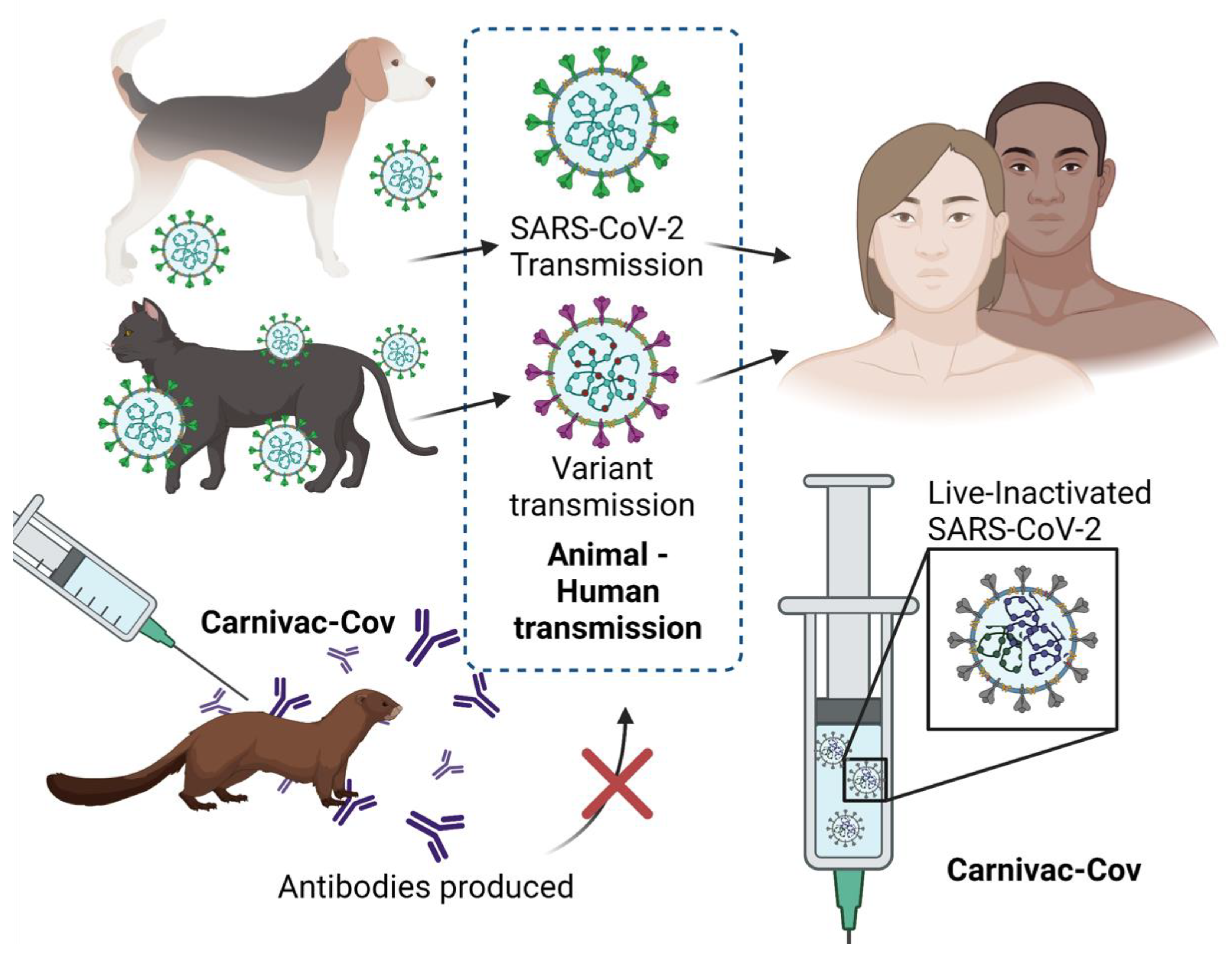A Veterinary Vaccine for SARS-CoV-2: The First COVID-19 Vaccine for Animals
Author Contributions
Funding
Acknowledgments
Conflicts of Interest
References
- Swelum, A.A.; Shafi, M.E.; Albaqami, N.M.; El-Saadony, M.T.; Elsify, A.; Abdo, M.; Taha, A.E.; Abdel-Moneim, A.-M.E.; Al-Gabri, N.A.; Almaiman, A.A.; et al. COVID-19 in Human, Animal, and Environment: A Review. Front. Vet. Sci. 2020, 7, 578. [Google Scholar] [CrossRef] [PubMed]
- Reuters. Russia Registers World’s First Covid-19 Vaccine for Animals. 2021. Available online: https://www.indiatoday.in/coronavirus-outbreak/vaccine-updates/story/russia-world-first-covid-19-vaccine-animals-1787543-2021-04-06 (accessed on 14 May 2021).
- National Center for Immunization and Respiratory Diseases (NCIRD). COVID-19 and Animals. In: Div. Viral Dis. 2021. Available online: https://www.cdc.gov/coronavirus/2019-ncov/daily-life-coping/animals.html (accessed on 15 May 2021).
- WION Web Team. Russia Produces First Batch of COVID-19 Vaccine for Animals. In: WION. 2021. Available online: https://www.wionews.com/world/russia-produces-first-batch-of-covid-19-vaccine-for-animals-381651 (accessed on 14 May 2021).
- Sinelschikova, Y. The World’s First Anti-Covid Vaccine for ANIMALS—Made in Russia! (Main Questions). In: Russ. Beyond. 2021. Available online: https://www.rbth.com/science-and-tech/333615-worlds-first-vaccine-animals (accessed on 15 May 2021).
- Andrew, E. Kramer. New York Times. 31 March 2021. Available online: https://www.nytimes.com/2021/03/31/world/europe/russia-covid-vaccine-animals.html (accessed on 14 May 2021).
- Tétrault-Farber, G.; Vasilyeva, M. Russia Registers World’s First COVID-19 Vaccine for Animals. In: Reuters. 2021. Available online: https://www.reuters.com/business/healthcare-pharmaceuticals/russia-registers-worlds-first-covid-19-vaccine-animals-watchdog-2021-03-31/ (accessed on 15 May 2021).

Publisher’s Note: MDPI stays neutral with regard to jurisdictional claims in published maps and institutional affiliations. |
© 2021 by the authors. Licensee MDPI, Basel, Switzerland. This article is an open access article distributed under the terms and conditions of the Creative Commons Attribution (CC BY) license (https://creativecommons.org/licenses/by/4.0/).
Share and Cite
Chavda, V.P.; Feehan, J.; Apostolopoulos, V. A Veterinary Vaccine for SARS-CoV-2: The First COVID-19 Vaccine for Animals. Vaccines 2021, 9, 631. https://doi.org/10.3390/vaccines9060631
Chavda VP, Feehan J, Apostolopoulos V. A Veterinary Vaccine for SARS-CoV-2: The First COVID-19 Vaccine for Animals. Vaccines. 2021; 9(6):631. https://doi.org/10.3390/vaccines9060631
Chicago/Turabian StyleChavda, Vivek P, Jack Feehan, and Vasso Apostolopoulos. 2021. "A Veterinary Vaccine for SARS-CoV-2: The First COVID-19 Vaccine for Animals" Vaccines 9, no. 6: 631. https://doi.org/10.3390/vaccines9060631
APA StyleChavda, V. P., Feehan, J., & Apostolopoulos, V. (2021). A Veterinary Vaccine for SARS-CoV-2: The First COVID-19 Vaccine for Animals. Vaccines, 9(6), 631. https://doi.org/10.3390/vaccines9060631






